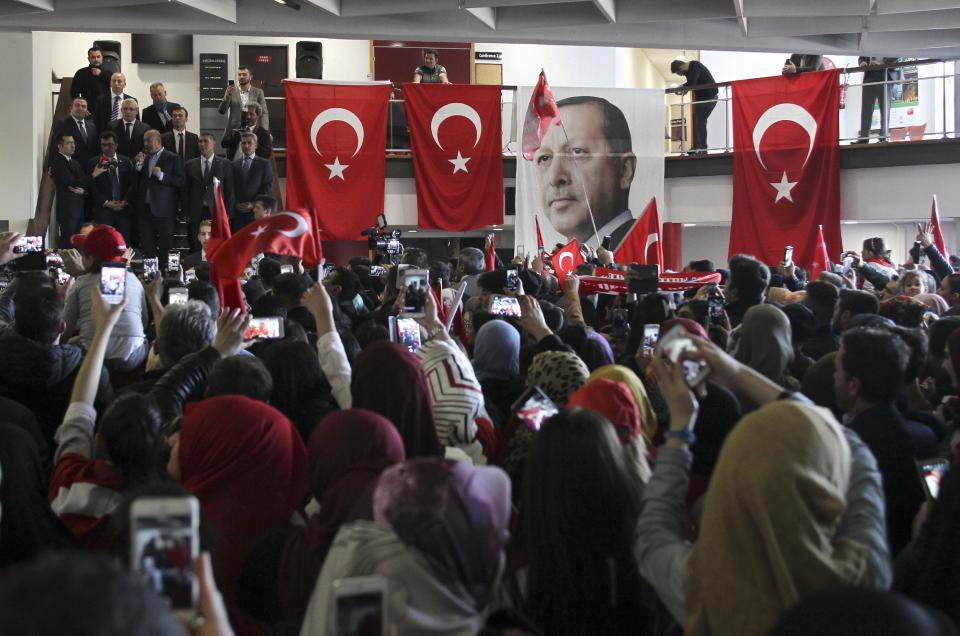A look at simmering tensions between Turkey and Netherlands
BERLIN (AP) — Diplomatic tensions between Turkey and Western Europe erupted over the weekend after the Netherlands blocked Turkish officials from holding rallies in their country, prompting a flurry of angry rhetoric and threats of dire consequences from Ankara.
Here are some questions and answers about the situation and how it escalated so suddenly:
___
WHY WERE TURKISH OFFICIALS HOLDING RALLIES IN THE NETHERLANDS?
Turkey is a month away from holding a referendum on whether to change the country's constitution. The proposed changes would significantly expand the powers of President Recep Tayyip Erdogan.
Opinion polls indicate the race is tight and Erdogan's ruling party is trying to drum up support for the "yes" camp by campaigning among diaspora Turks elsewhere in Europe.
There are around 400,000 people of Turkish origin living in the Netherlands, many of whom immigrated as so-called guest workers in the 1960s.
This has made Dutch cities such as Rotterdam a key campaign stop for Turkish officials.
___
WHY DID THE DUTCH BLOCK THE RALLIES?
The Dutch government said it withdrew landing permission Saturday for a plane carrying Turkish Foreign Minister Mevlut Cavusoglu because of "risks to public order and security."
Hours later, Turkish Family and Social Policies Minister Fatma Betul Sayan Kaya was prevented from entering the country's diplomatic compound in Rotterdam, setting up a standoff with armed police.
Rotterdam mayor Ahmed Aboutaleb accused the Turkish consul general of a "scandalous deception," saying he had denied that the minister was coming despite government warnings to stay away.
Kaya was later sent under escort back to Germany, from where she had entered the Netherlands.
___
HOW DID TURKEY REACT?
At a rally in Istanbul on Saturday, Erdogan compared the Dutch to "Nazi remnants," adding: "they are fascists."
It was the second time that Erdogan likened another country to the Nazis recently. The first was directed at Germany, after several local authorities in that country canceled campaign events by Turkish officials citing security reasons.
German Chancellor Angela Merkel responded Monday by declaring that the Netherlands has her "full support and solidarity."
Denmark, meanwhile, asked Turkish Prime Minister Binali Yildirim to postpone a planned visit because of the tensions between Ankara and the Netherlands.
Emmanuel Macron, a centrist candidate in the French presidential elections, called for a united response from European partners to what he described as "unacceptable comments" by the Turkish authorities.
___
SO IS IT TURKEY VS. EUROPE?
No. Despite the fiery rhetoric between Berlin and Ankara, Germany insists that it has no plans to impose a blanket ban on Turkish officials campaigning in the country.
The German government has also reacted coolly to suggestions that Turkey should be punished in other ways.
That's partly because of the large number of Turks in Germany — more than 3 million, of whom about 1.4 million are eligible to vote in the referendum.
Another reason for Germany's caution is the fact that Berlin needs Ankara's support to keep the flow of migrants into Europe under control.
A deal between the European Union and Turkey is considered one of the main reasons why the flood of migrants crossing into Europe has slowed to a trickle in recent months.
___
HOW WILL THIS AFFECT THE REFERENDUM?
The spat has already stoked nationalist sentiment among some Turks in Europe, prompting angry protests in Germany and the Netherlands.
Extensive coverage of the diplomatic dispute and its consequences could detract from the issue of the referendum itself.
Erdogan and his allies have also claimed that Western European countries are supporting opponents of constitutional change, suggesting that by voting "no" in the referendum voters would be backing Turkey's enemies.
The dispute also comes just days before the Netherlands elects a new lower house of Parliament.
The campaign was already dominated by issues of identity, with anti-Islam lawmaker Geert Wilders set to make strong gains. The dispute with Turkey, an overwhelmingly Muslim nation, adds fuel to that debate.
Dutch Prime Minister Mark Rutte's response appears to have played well with voters.
If it translates into a poll bump, it could be seen as a template for how mainstream politicians can regain ground lost to anti-immigration populists in upcoming elections in France and Germany.
___
A previous version of this story has been corrected to show that Erdogan's "Nazi remnants" comment was on Saturday, not Sunday.



